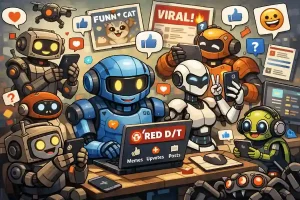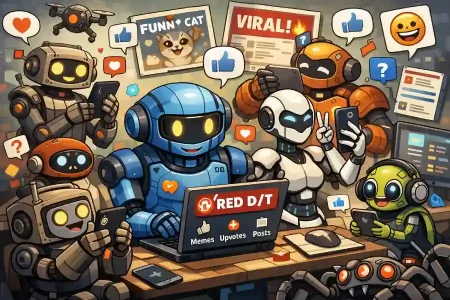According to BrightEdge Research, nearly 68% of internet activity begins on search engines, with around 90% of those searches taking place on Google….
This arrangement has held so strong for the last few decades that even a seemingly minor change has convinced some people that the system might be crumbling. We’re talking about the new (artificial intelligence) AI tool that appears atop the results when you perform a Google Search.
Despite generating iffy results sometimes, these AI-generated overviews succinctly summarise whatever information you’re looking for – so much so that sometimes you don’t even need to go past them to the actual web results. Welcome to the “machine web,” which might very well be how internet searches happen in the future, even if they’re facing issues currently. Will AI be the reason for the end of internet search as we’ve known it?

The Rise Of LLM-Powered Searches
Using search engines like Bing, Google, and the like is akin to walking into a library and obtaining a list of book titles that could help. Then, you need to go and pull the books off the shelves individually, read them, and try to put together a logical answer on your own. However, AI flips that search on its head, acting like this super-smart librarian who will read every book for you and even explains the answer to you, tailored to the context of your question, and that too in your language.
In some cases, all you want is a quick answer – a name, a date. However, you don’t have the time to piece together all the information you need. The “super-smart librarian” does it all for you. If you still don’t quite understand it, all you need to do is keep on asking questions, which the AI clarifies further.
People use Google Search a whopping five trillion times a year, practically defining the shape of the internet. That’s what Google has been banking on with AI Overviews. It’s interactive, its fluid, and it helps in a way that traditional search simply can’t.
Google’s new AI Mode takes the AI web search a step – or rather, a million steps – further. Google’s most powerful AI search yet, AI Mode employs Google Gemini 2.5’s advanced thinking, reasoning, and multimodal capabilities, helping with the toughest of tough questions. This radical departure doesn’t complement traditional search – it replaces it altogether.

Chatbots – The Rabbit Holes of Search
The power of AI searches has transcended the realm of mere search engines, and it’s not just Google or Bing search. With chatbots like ChatGPT, Perplexity, and Microsoft CoPilot now having access to the unending wealth that is the World Wide Web, they’ve become experts at finding up-to-date answers to even complicated questions.
For instance, when I asked ChatGPT the question — “How do I inspect my laptop’s cooling fan physically?” — I got a detailed answer without having to access a single page about laptop fans. Furthermore, the answer also included important safety warnings, with the chatbot even asking a follow-up question whether I needed answers tailored to my exact laptop model.
The conversational answers felt a lot more like chatting about laptop fans and less having to comb through links with never-ending text. Heck, chatbots can even put together entire research reports, complete with links, sources, and citations without you having to lift a finger.
How are LLMs a Threat to Web Searches?
Perhaps the hardest hit by this AI and LLM (large language model) takeover of the internet searches is resources based on informational content, like how-to tutorials and guides. Since chatbots and AI Overviews both provide in-depth answers within the search results, people are finding less and less need to click on these resources, with the shift hitting content marketers the most.
In fact, since AI-generated answers are satisfactory, nearly 60% of searches now yield no clicks at all. Furthermore, Google’s AI Overviews now take up as many as three full screen scrolls on a mobile screen and two full screen scrolls on a desktop, effectively lowering click-through rates even for highly ranked pages.
That’s not all; with users losing the motivation to visit web pages, advertisers might lose the impetus to pay for Google Ads as well. However, the threat of generative AI (GenAI) goes deeper than simply advertising-supported web search. The motivation to stop visiting web pages might also lead to webpage developers losing the motivation to new web pages in the first place. And we all know how significant a source of data public webpages is for training the LLMs that underline GenAI.
The topmost threat, though, ironically, is human laze. If one can easily find put-together information by asking GenAI, who needs the web?
What Does the Future Hold?
The pervasive nature of AI and LLMs on the internet doesn’t mean that they’re without flaws. In fact, one of the topmost drawbacks of LLMs is their tendency to hallucinate dangerous nonsense. If that wasn’t enough, GenAI could serve up entirely new answers to the same questions, or even generate different answers for different people, depending on what it knows of them. The arrival of AI in internet searches is the beginning of the end of the canonical answer.
However, there’s no denying that this is, indeed, the future of search. We’re on the cusp of a great revolution, and it’s all changing so quickly that all we can do is hang back and observe the great changes before we can ask: what will it all mean?
In case you missed:
- From Ranking to Relevance: The Rise Of Generative Engine Optimisation
- Is Generative AI Spinning a New World Wide Web?
- The Next Phase of AI: Deep Research
- All About AI Prompt Injection Attacks
- Millennials And Gen Z Are Using AI For Investment. How Prudent Is It?
- Can AI Modernise Legacy Systems?
- Chatting with ChatGPT? Be Warned – It Could Be A Downward Spiral
- Should Children Be Talking To AI Chatbots?
- Are Agentic AI Browsers Safe?
- AI And The Supply Chain: Reshaping The Logistical Network









